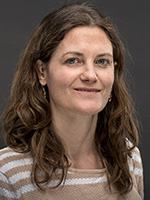Two Young Investigator fellowships from the Carlsberg Foundation
Two talented newly appointed Associate Professors has been granted founding to help them expand their research groups and pursue their supreme research
 Associate Professor Ida Moltke har received almost 5 million DKK for the project: “Genome Greenland” with the purpose of gaining insights into how colonization of a new remote region of the world, like Greenland, can affect a species evolutionarily.
Associate Professor Ida Moltke har received almost 5 million DKK for the project: “Genome Greenland” with the purpose of gaining insights into how colonization of a new remote region of the world, like Greenland, can affect a species evolutionarily.
There are only seven native land mammals in Greenland: muskox, caribou, arctic fox, arctic wolf, stoat, arctic hare and collared lemming and the question is whether the colonization lead to an extreme population bottleneck i.e., decrease in population size, like it did for Greenlandic Inuit? And if so, how has this affected their ability to survive in Greenland in the future?
Ultimately, the project will hopefully lead to key information and resources that can help in the efforts to conserve Greenland's land mammals both now and in the future with the ongoing climate changes.
 Associate Professor Elodie Mandel-Briefer has likewise received almost 5 million DKK for the project: “Vocal communication and group movement dynamics” looking into the role of vocalizations in facilitating and shaping animal group movement dynamics.
Associate Professor Elodie Mandel-Briefer has likewise received almost 5 million DKK for the project: “Vocal communication and group movement dynamics” looking into the role of vocalizations in facilitating and shaping animal group movement dynamics.
The project will move well-beyond traditional approaches in bioacoustics that have mainly focused on the information contained in animal sounds ('encoding'), to document how vocal information affects the behavior not only of one individual but of entire groups. This will provide a full understanding of group movement dynamics based on all levels of interactions.
The results of the project will contribute important insights that can aid the conservation of the near-threatened plains zebra and Eupsittula parakeets, whose populations have been sharply decreasing. The project can also have implications for domesticated animals, as findings on sheep will provide valuable knowledge on how emotions spread in herds, which can help improve animal welfare on farms.
Kontakt
Associate Professor Ida Moltke
Computational and RNA Biology
Ole Maaløes Vej 5
DK-2200 Copenhagen N
Mail: ida@bio.ku.dk
Associate Professor
Elodie Mandel Briefer
Section for Ecology and Evolution
Universitetsparken 15
DK-2100 Copenhagen ؠ
Email: elodie.briefer@bio.ku.dk
Phone: +45 3532 9033
Communications Officer
Sidsel Kretzschmer Henriksen
Department of Biology
sidsel.henriksen@bio.ku.dk
Phone: +45 3533 4147
